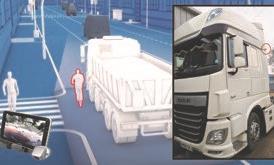
In 2012, Bibby training subsidiary System Training recorded a shock pre-tax loss of £7.5m, pushing its parent Bibby Distribution Services (Holdings) into a £4.6m loss.In 2013, System’s operating losses were cut to a “marginal” £500,000, and in its annual report Bibby said the business was now “more streamlined and focused” and that work was continuing to return it to profit.
Overall parent Bibby Group has now restructured its business, with Bibby Distribution renamed Bibby Supply Chain Services and System Training moved into a new division Bibby Employment Services along with labour agency Direct Workforce, Bibby Ship Management and Bibby Travel
Nigel Barton (pictured) was appointed MD of System Training in 2013 as part of a shake up of a senior management team that had overseen the ambitious acquisition of Hargreaves Training in 2010. This made System Training the largest training provider in the transport and logistics sector with a £16m turnover and 20 sites across the UK. These have now been slimmed down to 8 and Barton says System is going back to basics.
“The Hargreaves takeover distracted this organisation from its essential reason for being, which is logistics training,” Barton admits. “So we are getting away from being a jack of all trades and back to the heart of the logistics industry. We are going back to the knitting and keeping away from the distractions.”
Despite reducing the size of the organisation, System remains the “only national training company and the only one for logistics that encompasses both government funded and commercial training and tries to bring the two together”, Barton says.
“There are some good regional niche players but no one else covers the whole UK,” he adds.
Andrew Hartley recently joined System as business development director, having had spells with TDG and the University of Derby. He says that System is able to provide the initial training needed by new entrants into the sector to skills development for more experienced people looking to progress their careers.
“Workforce development is our commercial offer for people who are already in work in logistics. We also offer logistics apprenticeships and cover subjects such business admin and customer service training. We are seeking to have a more complete offer for the industry as there is increasing demand for more supervision and management elements in the programmes. We are talking to a couple of partners who operate in the higher level skills area to provide a more complete package,” says Hartley. “We also offer the full range of training to prepare to people to enter the industry,from forklift truck driving or warehouse and storage Level 1 to the traineeships, which were launched last year by the government. These are for people who have just come out of college or school but don’t have a job. Those are designed to get them ready to join the industry with skills development and work placements with the active engagement of an employer. That’s something we are actively promoting.”
With a traineeship, the trainee is not employed but gets a minimum six week work placement out of a 16 to 20 week programme.
“There is a ‘try before I buy’ element for the employer to see if they want to put this person onto an apprenticeship and the young person gets to see a real working environment and some upskilling,” says Barton.
Traineeships can lead on to a more traditional apprenticeship like driving goods vehicles, warehouse and storage, traffic office etc, where the apprentice is employed by a company with funding support from government.
As Stobart found when it tried to run a driving goods vehicle apprenticeship to bring young truck drivers into the industry, it is not easy to make the sums add up because there is no government funding for LGV licence acquisition.
“While there is a driving goods vehicle apprenticeship, the licence acquisition can cost £1,200 to £1,500 and you can’t get funding for that,” says Barton. “The Skills Funding Agency is quite clear at the moment they will not fund that because it is a legal requirement. Yet equal requirements are funded in other sectors so it is a something of an anomaly. We would like to see it change but that isn’t going to happen any time soon.
“You can bundle training together in an apprenticeship but not the test element. An apprenticeship is a defined sum of money and it is not huge when you take £1,200 out of that just to do the licence.
“Driving goods vehicles is also an issue because of the 16 to 18 year age limit. I think it will come back round for all the right reasons but it isn’t an easy one to pitch. It’s not just the employer, it is also what is the apprentice going to do in that period. They want to get on and drive so you can’t say to them ‘in two years time we might let you touch a truck’.”
Former System Training CEO Robin Brown tried to get a campaign going to raise the age limit for those eligible for apprentice funding to make it more relevant to truck driving. Sector skills council Skills for Logistics wrote a position paper for the skills minister on the subject, but partly due to lack of support from employers it failed convince the minister there was a strong enough case for change.
“But it is an anomalous situation, especially with the expected driver shortage come September,” says Barton. “Our sister company Direct Workforce could be placing 50 to 60 more agency drivers every week than they have got. They are doing the same as most of the others which is going out to Portugal and Spain and looking to recruit there. To me that is a nonsense.
“Why would you want to do that and then say we have 25% of our own young people out of work? So I share Robin’s annoyance. If there is a shortage it will be Bulgarian, Romanian, Spanish and Portuguese drivers coming to the UK to fill it. Is that a long term solution – probably not. Does it solve the problem by giving people a long term career path – no.”
Like many in the industry Barton wants to see employers doing more to promote the opportunities in logistics to young people
“People talk about promoting the industry in its widest sense but there is very little action,” he says. “It isn’t just fork lift trucks and driving – there is much more to it than that. Representing 8% of the workforce in the UK it has to be a major contender but there isn’t much activity to say ‘come and join us’.”
As well as running its own training courses, System heads up a consortium of 44 employers doing Driver CPC training. Consortium members use System’s JAUPT umbrella accreditation to run their Driver CPC courses to agreed standards. Like most training providers, System is seeing an upswing in demand ahead of the September 10 deadline.
“We saw the traditional downturn in the Christmas peak but on run up to October last year we saw Driver CPC delivery about double through the consortium,” says Barton.“Our own courses haven’t quite doubled but we are laying on sessions in most of the centres now at the weekend. It will be interesting to see what happens when we get to September and whether there is this tsunami of drivers leaving the industry.”
Barton hopes that for the next five year period of training after 2014 employers will plan better and get more value from the mandatory training. He also hopes that the DfT’s review of the Driver CPC regime will see a more thoughtful approach than the current requirement for drivers to simply attend five JAUPT-approved seven-hour courses.
“Right now we are probably seeing lots of people just crunching through the numbers but you would hope that people will see you can use the Driver CPC to gain business benefit as well getting the driver through a statutory requirement,” he says. “At the moment the Driver CPC is just time based and is just sitting through five sessions of drivers’ hours adding any value? That’s wrong. You could give more points for different elements which are more complex and that would be a more intelligent way of applying it.
“It has to become more than a tick box – it has to become of value to the industry, so it has to improve driver proficiency. JAUPT isn’t doing enough to develop the industry, its skill sets and its public image. I think the DfT has to make some changes after September. It would be a missed opportunity if they don’t. There is more than enough evidence that it is being treated as a tick box exercise and I will be amazed if they don’t do something.”









![Mercedes-Benz_eActros_600_(1)[1]](jpg/17820_mercedesbenz_eactros_600_11_978080.jpg)





